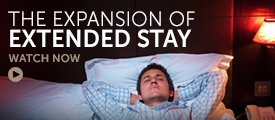New research from ExpertFlyer found that 72% of family travellers have either booked a non-traditional vacation accommodation, such as hostels or home and apartment rentals, or would consider it. The popularity of alternative accommodation continues to increase. For example, Evercore found that; ‘the online vacation rental market stands to grow from approximately $30bn to $70bn over the next five years.’
In these videos experts from different sectors discuss the appeal and profitability of their product compared to hotels:
Alternative accommodations not only appeal to markets untouched by hotels but can make better financial sense. Research by design consultancy WATG found that an aparthotel operation is able to drive higher levels of profit per sqm than an equivalent hotel operation (£488 and £442 per sqm respectively). WATG’s research also showed GOP margins of 63% for an aparthotel compared to 49% for hotel operations.
Online distribution has helped open up the market to different types of accommodation. Evercore’s report A Change of Vacation Plans, released in April 2015, states that the online vacation rental opportunity stands at approximately 7% of global bookings, a figure which they expect will increase to approximately 11% over the next five years.
The major distributors of vacation rentals are HomeAway, Airbnb and TripAdvisor. HomeAway has over 1 million listings. TripAdvisor’s Vacation Rental’s business grew from 29% of properties in 2011 to 45% by year-end 2014.
If you’ve been sent to this page and you’re not yet on the circulation list to receive these regular briefings and you would like to sign up, you can do see here. It’s free.
Video clips produced by ybc.tv for the Hospitality Channel, including interview from industry conferences such as the IHIF conference as well as specific Hospitality Channel shoots.


